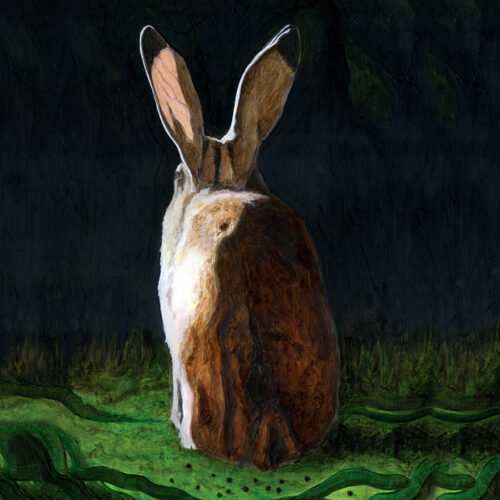Third Mouth is an inward journey. It’s not, as some have suggested, a folk album; it belongs to no tradition, and the lyrical references to place and nature are mostly imaginary and symbolic. The only landscape the songs reflect is that of the mind – a mind – and the only community a community of one. If it evokes a sense of mythology, then it’s strictly personal, rooted in Tucker’s own memories, associations and dreams. The album title comes from a time when, during his childhood, Tucker was told by his otherwise apparently very ordinary and down to earth mother that she could speak in tongues; that she possessed a “third mouth” as others might speak of a third eye. And the opening track, ‘A Dried Seahorse’ is based around another childhood memory, one that seems to have the surreal, isolated intensity of a remembered dream; Tucker’s father emerging from the garden shed to present his son with a tiny dried seahorse. The incident could have come from a David Lynch film, or perhaps Cronenberg’s Spider; the fact that the seahorse is the only creature where the male can carry the child adds another layer of symbolism to the tale.
Musically, although Tucker’s gently fingerpicked guitar dominates, there is a deliberately artificial shimmer throughout, and an electronic undertow created by his trademark loops that refutes any notion of the rustic or rural. In the absence of beats, Daniel O’ Sullivan’s droning viola, or cello-like bass synth, anchors Tucker’s often free-floating, otherworldly vocals. On the seven-minute plus ‘The Glass Axe’ they constantly swoop and climb, dip and ascend, as though the song were somehow constructed horizontally rather than vertically; like dream memories which, although they may seem to last for hours, are often stacked within only a few seconds of REM sleep. Yet there still remains a sense of something ancient and mysterious here, out of step with the clear logic of digital technology. When ‘Mullioned View’ collapses into glitchy loops, it’s as though the track has somehow become trapped in its own dark mirror.
One too-easy adjective that certainly does apply to Third Mouth however, is psychedelic. Not in any retro sense, although ‘Window Sill,’ where Tucker drops into a lower-than-usual register over choppy acoustic guitar, is uncannily reminiscent of Syd Barrett’s fractured, post-Floyd solo albums. It’s precisely the mixture of the hauntingly familiar and the unaccountably strange that conjures that thrilling sense of disorientation and wonderment – mixed with just a shiver of fear- that is the psychedelic trademark. Here all is mixed to a concentrated essence; the evocation of childhood inseparable from a death-aware darkness, sounds of running water and bells framed within a questionable unreality by the sampler’s art.
‘Andromeon’ is acoustic space rock, with its layered, near-chanting vocals and hypnotic tambura pulse; ‘Amon Hen’ resembles the lo-fi, pastoral krautrock of bands like Hamilton Yarns, with Karl Brummer’s discordant sax blurts staggering among a playgroup of woodblock percussionists. The title track justifies comparisons with Six Organs of Admittance, a cyclical mantra for acoustic guitar and heavy cello, while heartfelt psych-rock tribute to his favourite band, ‘Sitting In A Bardo Pond’ is, perversely, the catchiest, poppiest thing on here, with repeated, singalong verses and an actual chorus, buoyed up by backwards echo and electric organ.
At only 38 minutes, Third Mouth is a collection of blurred snapshots, out of focus and slipping through your fingers. Yet you gather them up and return to them again and again, trying to pinpoint the emotions they evoke, the rising melancholy, the itch of memories you can’t quite reach. Or maybe Third Mouth is speaking in tongues too; a rush of glossolalia, occasional sounds that resemble words; that suggest meaning; that almost approach sense. Maybe this inward journey is a different one for each listener. Alexander Tucker may not make folk music, but he can weave a magic spell.



